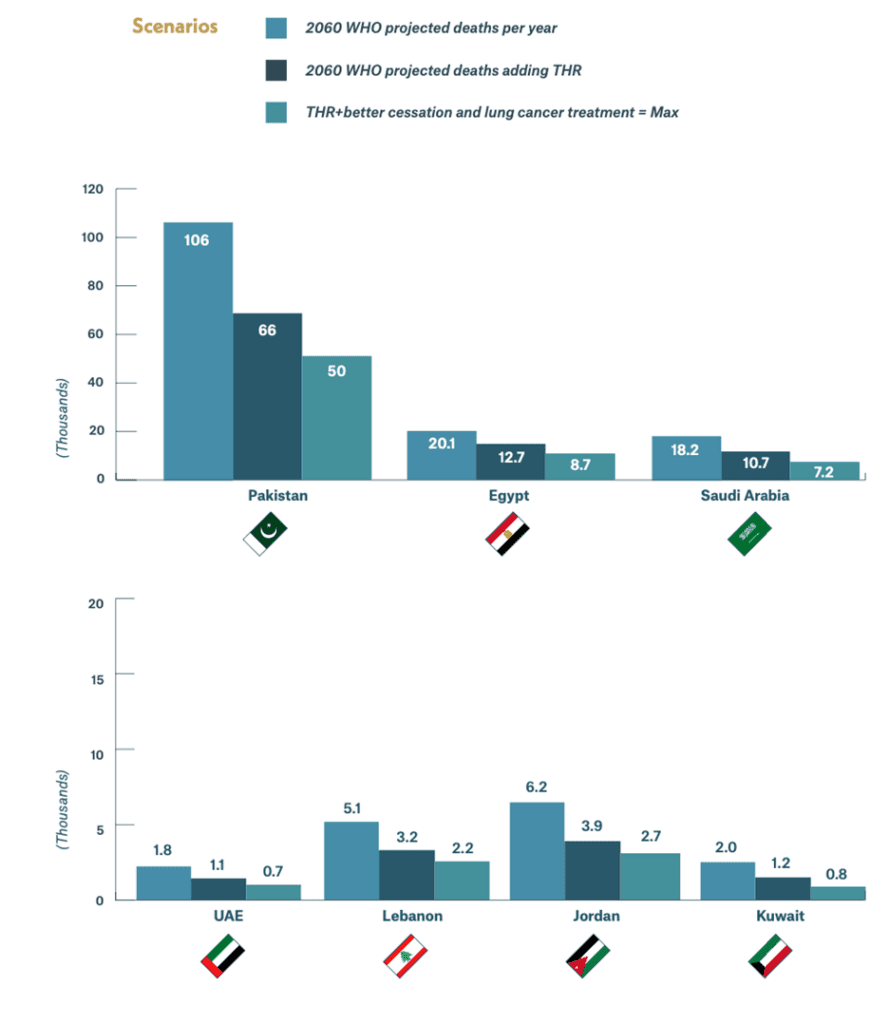Regulators Urged to Embrace THR
- Derek Yach Featured Harm Reduction News This Week
- June 12, 2024
- 0
- 5 minutes read


More than 1.8 million lives could be saved within the next 40 years by replacing World Health Organization-directed tobacco control efforts with products like vapes and e-cigarettes, snus and nicotine pouches, a new study has found. Urgent action is required to tackle continuing prevalence of smoking as global efforts to end smoking have stalled and current approaches to tobacco control have proven insufficient, the researchers said.
Instead of current measures, researchers found that tobacco harm reduction (THR) products that replace smoking with nicotine alternatives promise to make a significant improvement in health outcomes in the Middle East and save millions of lives.
The researchers studied the impact of tobacco use in seven countries in the Middle East including Pakistan, Egypt, Lebanon, Jordan, Kuwait, Saudi Arabia and the UAE, and determined that more than 384,000 die prematurely annually due to tobacco use. Tobacco use contributes to several major causes of death in these countries including lung and oral cancer, COPD, heart disease, and stroke, which are all set to increase in prevalence over the next few decades.
The ideal means of reducing this burden is through THR products which use nicotine without the deadly byproducts that cause disease. THR products like e-cigarettes/vapes, heated tobacco products, snus, nicotine pouches and charcoal free shisha are rapidly gaining traction among consumers in the Middle East and are considerably safer than smoking. However, these innovations have not yet been embraced by physicians and governments as means of cutting premature deaths.

Embracing THR, cessation, and improved lung cancer treatment represents a major opportunity for the Middle East to dramatically improve the health of its populations.
The report comes as the quality of evidence on the benefits of smoking cessation and THR has strengthened. Stopping tobacco use at any age is associated with longer survival, and switching to THR products is almost twice as effective for cessation as nicotine replacement therapies. While long-term studies on the health benefits of switching to THR are still needed, results of studies using biomarkers of future diseases are promising.
The report comes at a critical time as many Middle East countries’ reverse bans on some THR products and liberalize their approach to tobacco alternatives. Meanwhile, new and innovative THR products are being developed for the Middle East signaling the growing acceptance of the value of THR and the demand for them by consumers.
To benefit from the promise of these products the authors recommend educating physicians to communicate the benefits of THR to patients in all clinical encounters, countering disinformation about nicotine and the value of THR, and developing a regional equivalent of the Royal College of Physicians report on THR and vapes. The authors also recommend that policymakers revise regulations to improve access to THR products and invest in national science and research to replace tobacco with THR and establishing independent science-based consumer groups to advocate for their needs. The authors encourage religious leaders to guide their communities to quit smoking and support tobacco harm reduction.
“Embracing THR, cessation, and improved lung cancer treatment represents a major opportunity for the Middle East to dramatically improve the health of its populations,” said Derek Yach, lead author of the report, global health consultant and former senior WHO official. “The prevalence of smoking is projected to only decrease by less than 2 percentage, from 33.3 percent in 2020 to 31 percent in 2025. This preventable disaster should engender outrage and immediate action. This report aims to provide an alternative vision of what is possible.”
Figure: Projected deaths from tobacco in 2060

